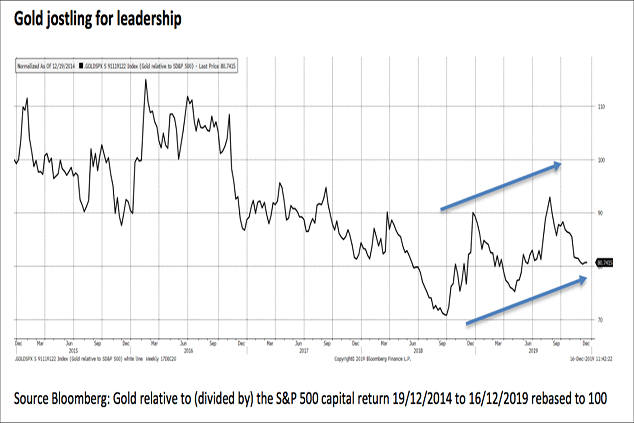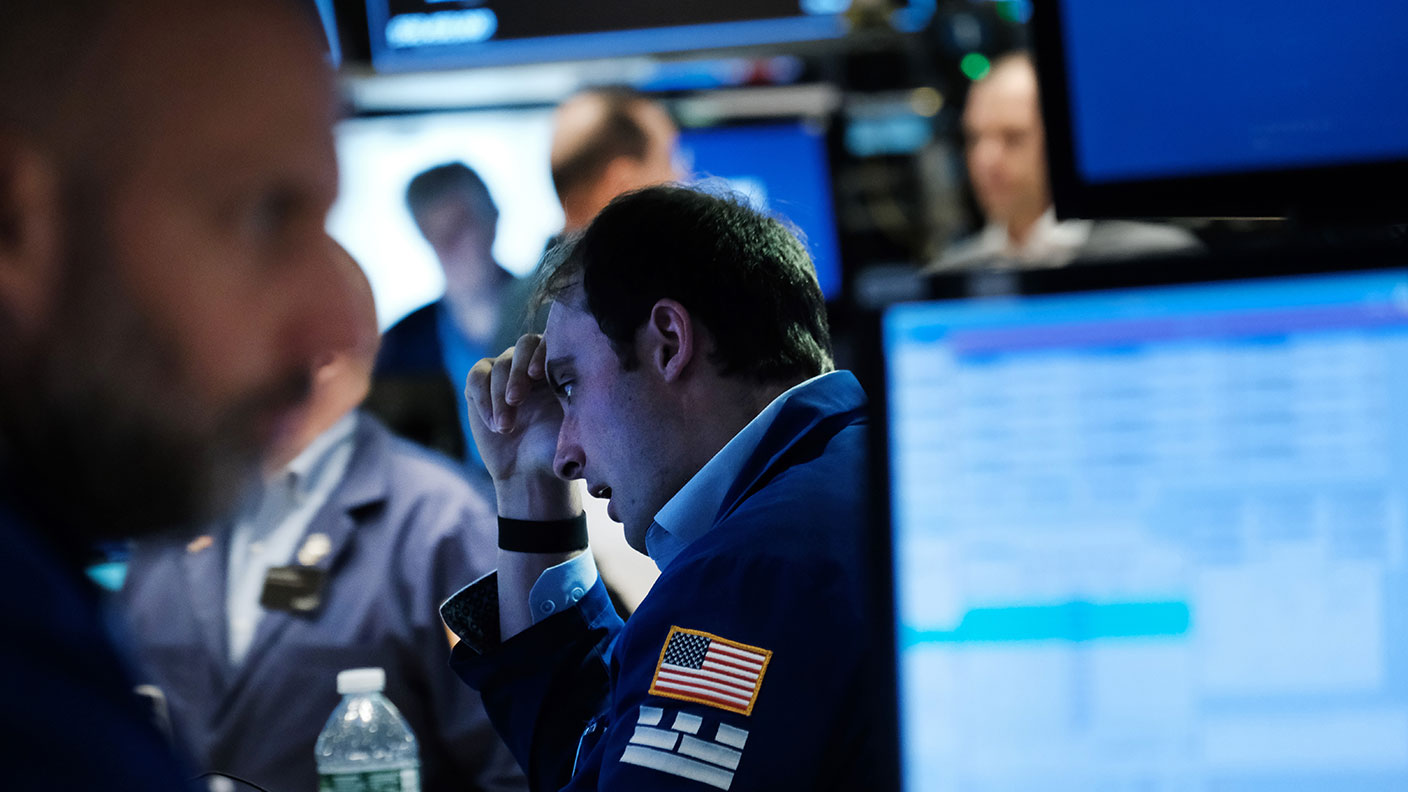Gold is in a bull market – and it could have much further to go
Many investors forget that gold is still the best-performing asset of this century, says Charlie Morris. It could also have much further to go.

Get the latest financial news, insights and expert analysis from our award-winning MoneyWeek team, to help you understand what really matters when it comes to your finances.
You are now subscribed
Your newsletter sign-up was successful
Want to add more newsletters?

Twice daily
MoneyWeek
Get the latest financial news, insights and expert analysis from our award-winning MoneyWeek team, to help you understand what really matters when it comes to your finances.

Four times a week
Look After My Bills
Sign up to our free money-saving newsletter, filled with the latest news and expert advice to help you find the best tips and deals for managing your bills. Start saving today!

Over the Christmas period, we have a special treat for you regular MoneyWeek contributor Charlie Morris explains why he thinks that gold could rise to more than $7,000 an ounce. Check out the first instalment below.
A year ago, in my occasional free newsletter, Atlas Pulse, I upgraded gold which was trading at $1,239 an ounce at that point to "bull market" status for the first time since 2012.
Unlike the gold bugs, I'm not a broken record. And unlike the barbarous relic brigade, I recognise gold's importance in the modern world.
MoneyWeek
Subscribe to MoneyWeek today and get your first six magazine issues absolutely FREE

Sign up to Money Morning
Don't miss the latest investment and personal finances news, market analysis, plus money-saving tips with our free twice-daily newsletter
Don't miss the latest investment and personal finances news, market analysis, plus money-saving tips with our free twice-daily newsletter
I analyse the gold price and outline the bull/bear regime with the reasons why. It is an evidence-based approach with an enviable track record. I tell it how I see it and find the air-punching narratives tedious. You won't find one here.
As I write, the gold price is $1,475, up 15% this year having touched $1,550 (+21%) in September 2019. If the current price holds, this will turn out to be the best year for gold since 2010. And as we move into 2020, I bring further good news; this bull market has legs.
In fact, a bullish target of $7,166 is logical and plausible.
I'll get on to how that could happen in Monday's Money Morning. But for now, let's start with the basics...
Here's what a gold bull market looks like
An Atlas Pulse bull market in gold has three conditions that I came up with more than a decade ago:
1. Easy money (US cash real interest rates below 1.8%)
In 2019, the Federal Reserve stood back from further rate hikes, and we've seen an increase in the balance sheet, as tapering has reversed course. "It's not QE," they say but it doesn't smell quite right regardless. Whatever it is, the Fed's balance sheet is growing again and policy is easy.
2. The long-term gold trend in non-dollar terms must be positive
This simple test ensures we don't mistake dollar bear markets for gold bull markets. Since 2000, the world's best currencies have been the Swiss franc and the Thai baht, and gold recently broke higher in both. That implies that gold is rising everywhere.
3. Gold must be beating the stockmarket
Few seem to recall that gold is still the best-performing mainstream asset of the 21st century. It has smashed global equities, which have been held back by poor performance in Europe and Japan. Gold has also managed to stay ahead of US equities, which have been strong since 2013.
Gold even managed to keep up with the emerging markets they remain the leading equity region to this day, if only just. Gold remains in the lead despite a savage bear market between 2011 and 2016 and having no yield to fall back on. It's a remarkable achievement, that most people probably don't realise.
But we want to look forward, not back. You can't escape that equities nudged past after the 2011 peak. The relative position is important, because investors need to know that they can allocate large sums of money to gold without missing out on equity performance.
If equities are lacklustre or troubled, it's an easy decision to make. But if they are strong, like they are now, it's harder.
I can't promise that US equities will face imminent collapse, but for gold to rally, they don't need to. The largesse in equities has, in part, come from economic growth, but bigger drivers have been easy money, financial engineering and stimulus.
As we step into 2020, with the threat of tightening behind us, there is no reason for gold to lag equities in future. A Goldilocks scenario (just the right amount of inflation) seems to be unlikely, because we've already had that. And since late 2018, asset returns seem to have broadened out. It's no longer just about US equities.
Can gold start to pull ahead of US equities again as 2020 beckons?
The chart below shows gold versus US equities over the past five years. Gold (reading of 80), means it has only lagged by 20% in a roaring equity bull market dating back five years, which isn't very much at all.

And since September 2018, gold has been beating equities, with higher highs and higher lows. A new high above 92 would generate significant confidence in the gold market, as that would bank four years of outperformance. It really wouldn't take much for that to happen.
In short, the Atlas Pulse conditions for a gold bull market are met. I said that this time last year, and I am reiterating that point now. Equity outperformance could be a little stronger, but at least there's no material lag.
On Monday, I'll turn to the one thing that could change everything. This has the power to turn a dreary bull market, driven by falling bond yields, into something you can really sink your teeth into. Charlie Morris is the head of multi-asset at Atlantic House Fund Management, and is also a regular contributor to MoneyWeek. This article was first published in the Atlas Pulse newsletter, in December 2019. Sign up for Atlas Pulse newsletters to receive them when they are released. Charlie is also CEO and founder of cryptocurrency data site, bytetree.com.
Get the latest financial news, insights and expert analysis from our award-winning MoneyWeek team, to help you understand what really matters when it comes to your finances.
-
 Can mining stocks deliver golden gains?
Can mining stocks deliver golden gains?With gold and silver prices having outperformed the stock markets last year, mining stocks can be an effective, if volatile, means of gaining exposure
-
 8 ways the ‘sandwich generation’ can protect wealth
8 ways the ‘sandwich generation’ can protect wealthPeople squeezed between caring for ageing parents and adult children or younger grandchildren – known as the ‘sandwich generation’ – are at risk of neglecting their own financial planning. Here’s how to protect yourself and your loved ones’ wealth.
-
 The markets say sell, but should investors listen?
The markets say sell, but should investors listen?Analysis As fear grips markets around the world, investors need to have an honest conversation about what they’re comfortable with owning.
-
 As global powers fight it out, commodity prices are set to rocket
As global powers fight it out, commodity prices are set to rocketAnalysis Commodity prices have been held down by globalisation. This trend is now rapidly reversing.
-
 Is gold cheap relative to equities?
Is gold cheap relative to equities?Analysis Dominic Frisby looks at the Dow-gold ratio and explains why gold is starting to appear inexpensive compared to equities.
-
 Are we heading for a commercial property crash?
Are we heading for a commercial property crash?Analysis The pandemic has reduced the demand for office spaces and permanently changed the office environment. But John Stepek says rising interest rates are a bigger threat to commercial property right now.
-
 Is the oil market heading for a supply glut?
Is the oil market heading for a supply glut?Analysis Many people assume that the high oil price is here to stay – and could well go higher. But we’ve been here before, says Max King. History suggests that supply will increase to more than meet demand.
-
 Why has the Terra stablecoin broken its US dollar peg and should you care?
Why has the Terra stablecoin broken its US dollar peg and should you care?Analysis The Terra stablecoin is supposed to match the value of the US dollar – but its value has crashed. John Stepek explains what it means for you and your investments.
-
 Alphabet and Microsoft look like gems in the rubble of the tech sector
Alphabet and Microsoft look like gems in the rubble of the tech sectorAnalysis Tech stocks have fallen hard this, with the Nasdaq index down 22% since November. But both Alphabet and Microsoft are still both worth a look, says Rupert Hargreaves.
-
 The UK’s new energy strategy has been revealed – here’s how you can profit
The UK’s new energy strategy has been revealed – here’s how you can profitTips The UK has just released details of its long-term energy strategy, which emphasises offshore wind power. Rupert Hargreaves explains how you can invest.
